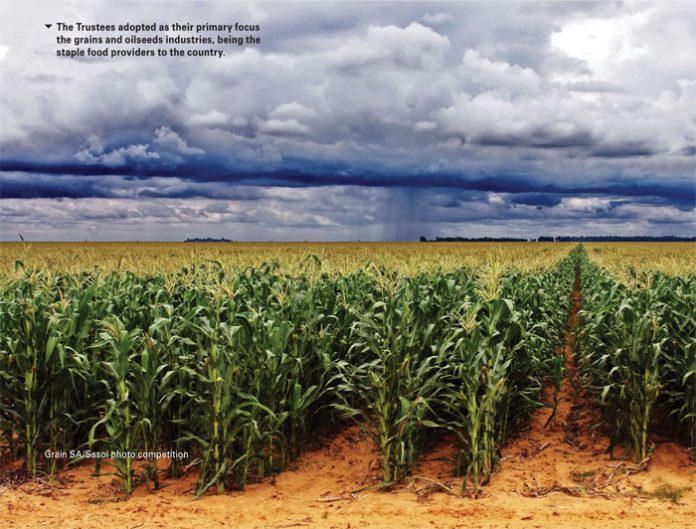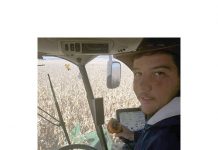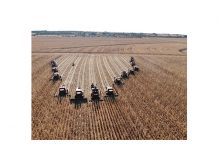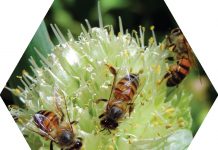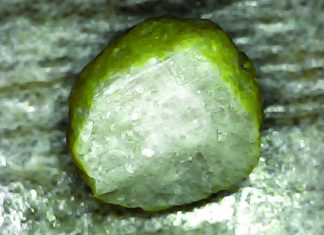July 2017
LEON DU PLESSIS, administrator, Sasol Agricultural Trust
The Sasol Agricultural Trust was founded in March 2012 by Sasol Chemicals Industries Limited. The Trust received donations from the founder in the amount of R30 million.
The mission of the Trust is encapsulated in the main objective of the Trust, namely to improve competitiveness and sustainability of the agricultural industries, by funding market and production related research, market information, market access, enterprise development, education and training programmes and scholarships, bursaries and awards for agricultural studies.
Current trustees are Messrs Jannie de Villiers (Grain SA and chairperson), Jaco Breytenbach (Grain SA), Prof Ferdi Meyer (UP), Messers Omri van Zyl (Agri SA), Danie Roode (Sasol), Dr Eric Adriaanse (Sasol) and one vacancy. The representative nature of the Trust provides the basis for informed and appropriate decisions that would benefit the agricultural industries at large.
Agricultural industries are defined in the widest sense as far as support by the Trust is concerned, although the Trustees adopted as the primary focus the grains and oilseeds industries, being the staple food providers to the country.
Opportunity, industry and market
The Trust identified a number of areas where it could play a role in achieving its objectives within the Trust’s available resources. These are, inter alia:
- Funding of agricultural research activities and programmes that are generic in nature or that spans across different commodities.
- Provision of bursaries, scholarships and training opportunities in fields not currently addressed by the agricultural industries.
- Funding of surveys and projects that are deemed necessary to improve the market for role-players and the supply of inputs to producers.
- Funding of projects to improve the provision of market information and transformation initiatives.
Other agricultural trusts are commodity-specific and can therefore not fund projects or initiatives that are not directly linked to the commodities concerned. The Sasol Agricultural Trust does not have this limitation and can address the gaps that exist.
For this reason, the Sasol Agricultural Trust plays a complementary role to the actions and projects funded by the commodity trusts, without entering the domain of those trusts and without creating rivalry or duplication. Good co-operation exists between the Trust and the commodity trusts with regard to the granting of bursaries and scholarships.
Strategy
It is a known fact that funding for agriculture, particularly funding aimed at research and capacity building, has declined over time. The Trust focusses on important and dedicated programmes to alleviate this problem. Through careful and focussed funding, large benefits can be achieved and critical issues can be successfully supported.
Most industries have responded positively to invitations from the Trust for the funding of a variety of initiatives. It is believed that this will expand over time and specific niche funding opportunities will be identified that could be explored by the Trust.
Bursaries, scholarships, internships and training courses are important aspects of the Trust’s funding strategy, particularly to build capacity and to ensure proper skills development and job creation in the agricultural industries.
Management and organisation
The representative nature of the Trustees creates a comprehensive scope of expertise within the Trust.
Administration and day-to-day affairs are managed by L&L Agricultural Services (Mr Leon du Plessis), an independent firm that renders similar services to a number of other agricultural trusts and entities. The Trust’s investments are managed by a professional private wealth asset management firm.
Requests for funding applications are communicated via agricultural publications and through existing industry structures. Norms and procedures for funding have been developed and certain conditions apply to the funding granted by the Trust.
Bursaries (for national and international postgraduate studies) are advertised annually, as well as for any training courses that the Trust is prepared to support. Specific conditions apply and successful bursary students are expected to work in agriculture for the same period as the term of the bursary.
Funding granted by the Trust
Here are examples of funding already granted by the Trust to beneficiaries since inception.
Monitoring of fertilisers and agro-chemicals
The Trust approved funding for a joint project of the Fertiliser Association of South Africa (Fertasa), Grain SA and the Department of Agriculture, Forestry and Fisheries (DAFF).
Producers, from time to time, experience problems with fertiliser and agro-chemical quality. Individual producers often do not have the means of taking legal recourse against the supplier. Funds were therefore made available to assist producers in addressing problems that they experience with fertiliser and agro-chemical quality.
Rodent pest management
The University of Venda was funded for a project aimed at the ecological management of rodent infestations in grain fields, which was done in conjunction with other projects where different methods were applied to control rodents.
Attendance of international conference
The Southern African Grain Laboratory (SAGL) received funds for the attendance of the Micronutrient Forum Global Conference by two of its analytical staff during June 2014 in Ethiopia. The SAGL is increasingly playing an important role as a reference laboratory in agriculture and this initiative presented an opportunity to build capacity in the industry.
Sclerotinia research on soybeans
Two research applications are funded by the Trust regarding sclerotinia on soybeans, respectively by the University of the Free State and the University of Pretoria. These two projects are complementary and good collaboration exists between the researchers.
The research by Free State University focusses mainly on the epidemiology of the pathogens and the successful application of fungicides. The project from the University of Pretoria focusses on aspects regarding sclerotinia that are not covered in the project of the University of the Free State and focusses mainly on the understanding of the soil-borne pathogen and how to address the occurrence thereof on soybeans through farming practices and crop rotation.
Maize hardness project
The SAGL also received funding to do research on the effect of environmental and soil factors, including fertiliser selection, on the hardness of maize produced under dry-land precision farming.
This project has the potential to generate useful data on the question of maize hardness in South Africa.
Nitrogen fertiliser management
The Western Cape Department of Agriculture is being funded by the Sasol Agricultural Trust to develop nitrogen fertiliser management strategies for wheat and canola under conservation agriculture practices in the Western Cape. This project is producing good results and aims to finalise in 2018.
Jobs Fund projects
For two consecutive years, the Trust funded an equal amount to the grant from government in terms of the Jobs Fund to assist subsistence maize producers on communal land. The utilisation of these funds is facilitated and monitored by Grain SA in accordance with the requirements and rules of the Jobs Fund. Currently 3 400 producers are assisted through this project by Grain SA on more than 4 000 ha.
The Trust recently also approved funding for the development of a promotional DVD with regards to the Jobs Fund beneficiaries.
Interns and capacity building
Funds were made available to Agri SA for the appointment of a number of interns to develop specific functions to the benefit of organised agriculture. The immediate cost of interns is lower than that of permanent employees and create the ability to build capacity within Agri SA on a larger scale and in less time.
Funds were also granted to Grain SA for capacity building in its Research and Policy Centre through the appointment of an intern and the development of an application on smart phones. This Centre created within Grain SA aims to improve collaboration between researchers and research institutions and to facilitate focussed research on behalf of and to the benefit of grain producers.
Bursaries for tertiary studies
The Trust, in total, has granted seven bursaries to students for post graduate studies in relevant topics related to grain.
Students’ progress is monitored throughout their studies and continued payments are subject to the required progress reports being submitted and approved by the Trust.
For more information about the Trust, contact Leon du Plessis at 012 807 3958 or l-lagric@mweb.co.za.
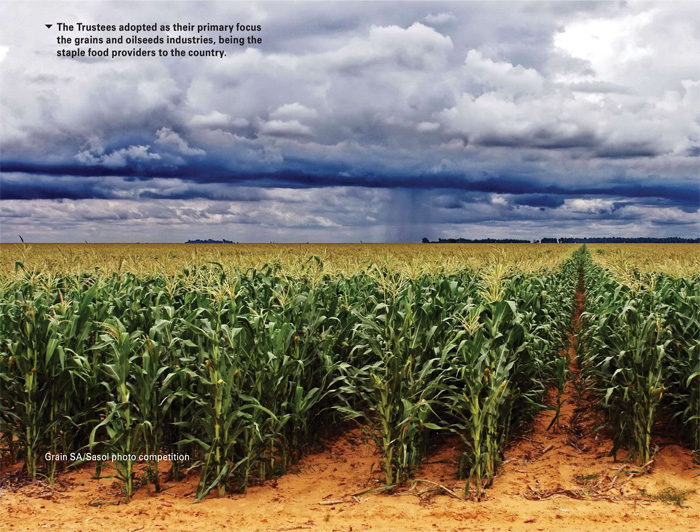
Publication: July 2017
Section: Relevant



